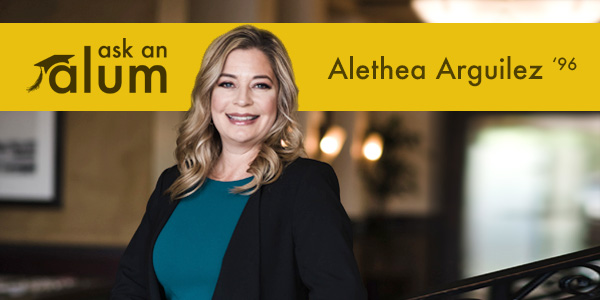There are about a quarter of a million children in San Diego age 5 and under — and
Alethea Arguilez ’96 is out to ensure those most at risk have a chance to succeed. Arguilez is entering her second year as the executive director of the
First 5 Commission of San Diego, an organization that assists the well-being of young children ages 0-5 years, pregnant women and families through direct services and public education campaigns. First 5 reaches more than 50,000 children, families and providers each year.
We recently sat down with Alethea to discuss her passion for early childhood education and how her experience in the Department of Child and Family Development propelled her down her current path.
What is the most rewarding part of what you do?
"I’ve spent more than 20 years working with families, as a home visitor, a teacher, a center administrator and then leading a child development program. One of the most rewarding components of coming to First 5 is having a broad view of the system that families and children engage in — and having the opportunity to influence it. I get to support and advocate for the children and families that we serve and, of course, the providers. I love being able to bring others together around this big picture vision and positively impact lives."
How did your time at SDSU impact the professional you are today?
"It's pretty fascinating when I think back to the doors that opened up for me at SDSU. I had a professor (
Dr. Sarah Semlak) when I was a junior in my Child and Family Development undergrad program. It was a family and community engagement course and she said, ‘I think you should do a project at a local Head Start program.’ I didn't even know what Head Start was. I went to complete a parent engagement project at a local Head Start and I immediately fell in love with the model; I could see it as a potential career path for myself. I was on the administrative track at the time, so I knew I wanted to be an administrator, but it also made me want to learn more about direct services. That was a turning point for me. I met key people in the field and I was introduced to an individual working in the program who hired me when I was three months away from graduation at SDSU. I spent over 20 years working in the Head Start program and had the amazing opportunity to really apply the theory I learned in my undergrad program to the work I was supporting in Head Start.”
What are some other formative experiences in your program?
"
Dr. Shulamit Ritblatt was one of my professors and mentors and we had one project where we had to work with or mentor a child who had an identified special need. I remember a young boy with Down syndrome, and I got to work with him and his family. Having this real-life connection to what we were learning in the coursework was really beneficial. The practicum component to the theory is really, really important to the student and it’s really important that San Diego State has maintained fidelity to that model and improved it over the years. It helps students be truly prepared once they get out in the workforce."
Why are you proud to be an alumna of Child and Family Development?
"I've maintained a tremendous connection to San Diego State and it's so beautiful to see the evolution in the Department of Child and Family Development throughout the years. They're really preparing the workforce of tomorrow in early care and education by growing and mentoring the young people who are coming up in program. I had the blessing to be a part of that in the 1990s and to see that come to fruition in this manner today is very exciting for me."
Do you have any advice for current COE students?
“Take the opportunity to the find a mentor — to seek and be connected to someone who has a similar passion and alignment of vision for impacting the lives of children and families in a positive way. Finding a mentor was really helpful to me and continued to be throughout the years in my career. It's paved the path. Also, getting out in the community and understanding what the needs are from a direct relational perspective is really beneficial. Direct connectedness to the community always opens up doors for those next steps.”

